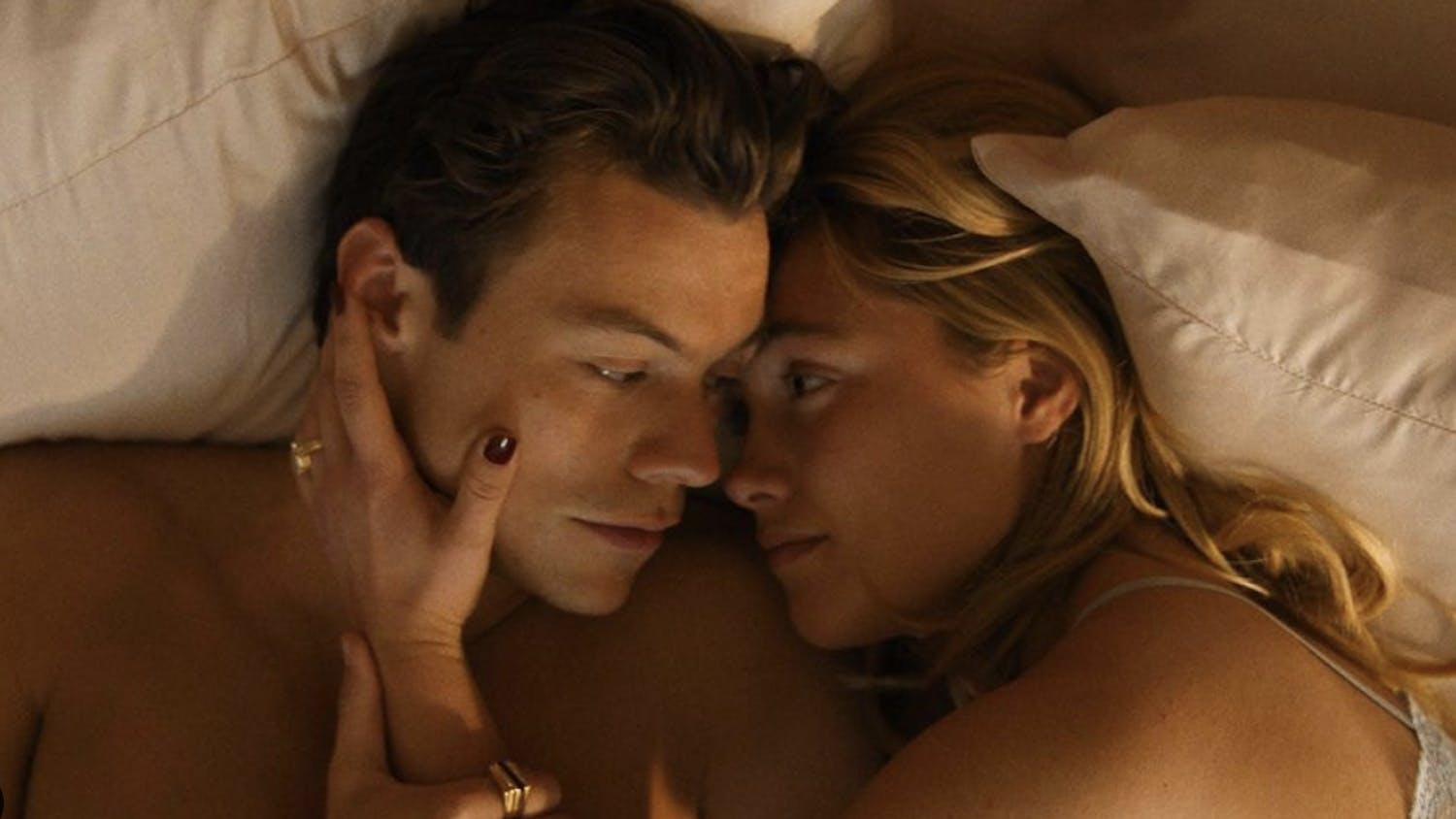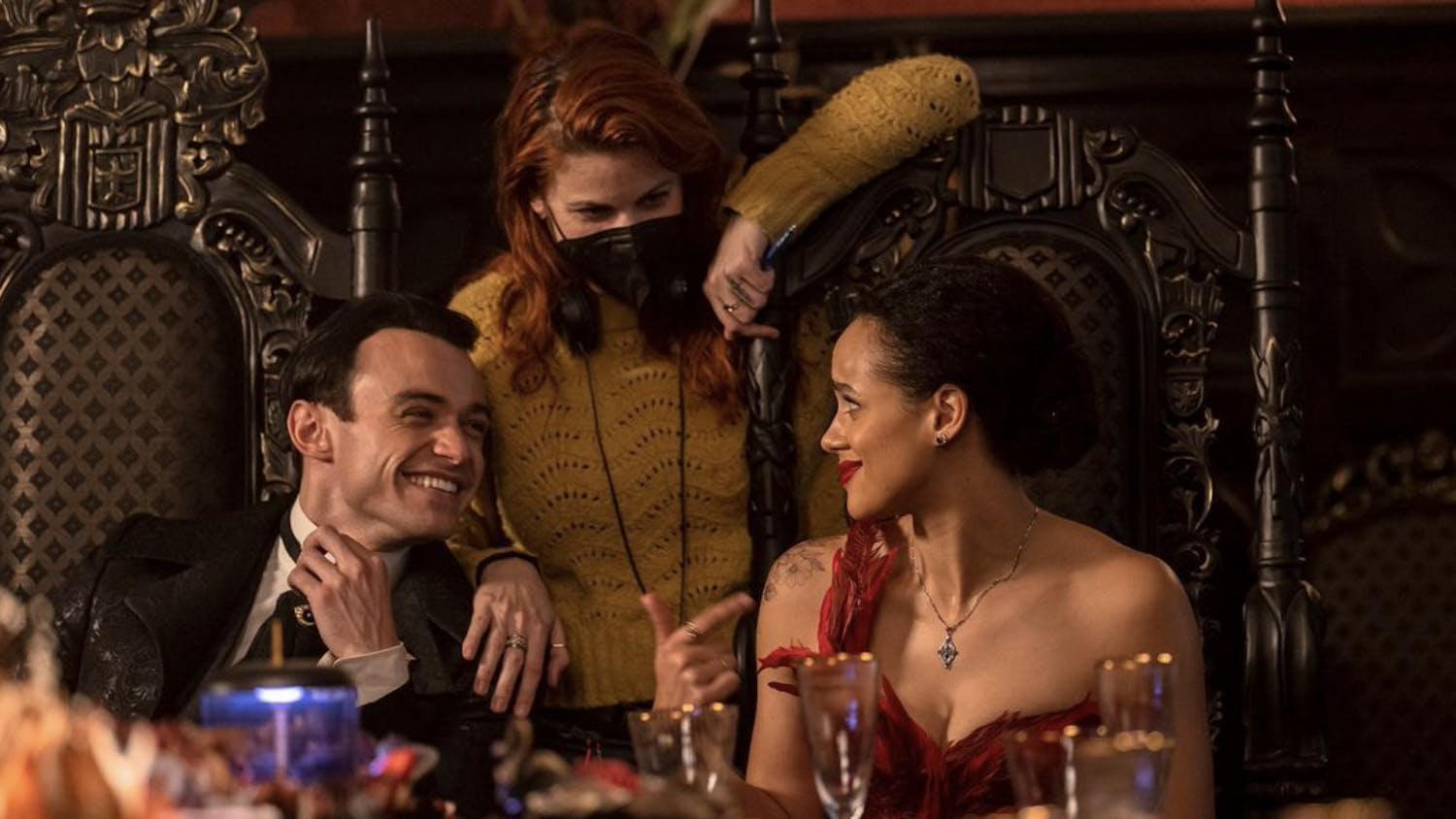Editor’s Note: This review contains spoilers for “Don’t Worry Darling.”
By now, most film connoisseurs and anyone who keeps up with the tabloids and entertainment news has Olivia Wilde’s sophomore directorial film, “Don’t Worry Darling” on their radars.
In wake of the immense drama that happened on set with Wilde, Harry Styles and lead Florence Pugh, the film’s release has been highly talked about and anticipated. However, much of the talk had more to do with what occurred off-screen than what happened on-screen. Following the Sept. 23 release, though, the complex plot, acting and overall aesthetic is worth more discussion than the drama itself.
Simply put, there is a lot to dissect within the film. It’s bizarre, eccentric and says more about society’s current state than what appears to meet the eye.
The film follows the marriage between Alice Chambers (Florence Pugh) and Jack Chambers (Harry Styles) in the supposedly picture-esque utopian society of Victory in the 1950s.
Yet, much of the couple’s actions did not align with the morals and traditions of the 1950s. Those subtle cultural differences acted as the first sign that something in the town of Victory wasn’t aligning. From Alice and Jack’s casual sex, them not wanting children and a lot of heavy drinking to the so-called technological project the men of Victory were working on, casual dialogue and cursing, Wilde strategically made it appear as if the two weren’t actually living in the ‘50s, before any part of the film confirmed that wasn’t the case.
Several other oddities occurred to both Alice and her neighbor Magaret (KiKi Layne) which acted as metaphors for what was truly happening to them.
For starters, Alice cracked several eggs, all of which were empty and had no yolk. She also began randomly wrapping her face in Saran wrap and even became trapped between the window glass she was cleaning and the wall behind her. As for Margaret, Alice hallucinated seeing her banging her head against glass until it physically cracked. All of those occurrences were literal signs that there were cracks in Victory and that Alice and the other women in society were trapped, a theme that was evident, though viewers were unsure why they were trapped.
Conveniently, none of the men ever raised questions as to what was happening, and only the women did, leaving the husbands able to gaslight their wives, as the ending of the film proved they weren’t simply oblivious to mastermind Frank’s (Chris Pine) schemes, but were actually in on them.
Throughout the film, it was evident something was wrong, yet most viewers weren’t able to put their fingers on exactly what, making for a lot of unanswered questions. Some were answered within the last half hour of the film, but others left viewers conspiring about the meaning of everything, well after leaving the theater.
One of these questions undoubtedly was what the deal with Victory’s headquarters was. All that was known was that the men drove to headquarters — a large, circular structure built on the top of a mountain — every day, at the same time, while the wives stayed home, and that it was completely forbidden to the women of Victory to go there.
Toward the beginning of the film, Alice saw a plane crash near headquarters while taking the trolley into town and went to headquarters in search of help. Once Alice reached the building, she touched her hands to one of the structure’s windows and immediately began seeing visions, losing consciousness soon after.
Alice woke up extremely confused in her home. Of course, Jack played it off as if she were crazy, and Alice believed him.
That same situation happened again after Alice claimed she saw Margaret slit her throat and die.
From this point forward, Alice began asking more and more questions regarding what was happening to her, and she confided in her husband Jack and even asked to move away.
It seemed as if things would improve after Jack, though reluctant, agreed to move with her. But, that couldn’t have been further from the case. That’s when things began going downhill and reality revealed itself.
Turns out, Jack, Alice and the rest of Victory were actually physically alive in modern day, while their souls were living in a highly evolved simulation to escape life’s everyday issues. The twist, though, was that the men signed themselves and their woman of choice up for that alternative reality without the consent of the women.
That was because Jack was considered what is known as an “incel” in the real world. Incel stands for involuntarily celibate, and people who describe themselves this way often “seek to commit violence in support of their belief that women unjustly deny them sexual or romantic attention to which they believe they are entitled,” according to the U.S. Department of Justice.
Jack felt this way due to Alice’s long, onerous hours of working as a nurse and her not wanting to be intimate with him as a result.
Wilde said in an interview with Interview Magazine that Chris Pine’s character was based on Jordan Peterson, a professor turned proselytizer who preaches male dominance and gender role conformity to the online incel community.
In a scene in modern day, Jack can be seen listening to one of Frank’s messages on the internet explaining his “better” world, where men can have their wives at their convenience. That became appealing to Jack, who, instead of being a loving, attentive husband, was actually a controlling toxic male partner.
That revelation changed the scope for the film as one that held a strong feminism trope, yet wasn’t executed with a strong moral message, considering so many crucial details were left undefined.
Viewers are left wondering why Shelley (Gemma Chan) stabbed her husband Frank, why Bunny (Olivia Wilde) failed to help Alice earlier and what possibly happened to Alice after she reached headquarters at the end of the film.
As a result, those questions were all left up to assumption. Other questions, which remained unanswered, were what was the purpose of the red plane? Did it serve to act as a warning symbol to Alice’s real-life unconscious body? What was the point of the creepy kick-line dancers? Was it played on repeat in the real-world as a hypnotizer? Were all of Alice’s previous memories of her real life erased?
How did Alice go to the bathroom while laying beside Jack? Did Jack handle her loosely-alive body when he returned to his 9-5 job? How long was she laying there for? Did no one in her life wonder where she went? And how will she be able to break free of the cuffs that kept her bound to the bed after waking up at the end of the film? And what was the point of having Harry Styles do barrel rolls on stage for five minutes, other than that it was comical?
Apparently, there was no time allotted to answer those questions, though there was enough time to build up a lot of tension and rush the ending, the only part of the film that made the film worthwhile.
The physical depiction of the modern day was a wise film decision, as it was meant to show the difference between what the men in the film perceived their actual life to be, compared to the one where their wives were complacent and available to them whenever they pleased.
It’s an interesting take on differences in decades and gender roles, but one that didn’t have much to say, other than that maybe men are still controlling in heterosexual relationships?
Nonetheless, it doesn’t take away from the fact the twist was shocking and couldn’t be seen coming from a mile away. Arguably, the plot twist of the thriller, in addition to the acting and cinematography, was the best part of the film. Jaws evidently dropped in the theater in response to Styles’ greasy modern day appearance, and cellphones entered the frame in a contrastingly dark real-world, given viewers were convinced Jack and Alice lived in the ‘50s, and that Styles’ character was as attractive as he is in real life.
As for casting, the decision to cast one of the most famous men on the planet, pop-star Harry Styles, was a loaded decision, but most definitely a strategic one. The film was able to bring in not only loyal movie-goers, but also loyal Styles fans, as many were excited to see him on the big screen, particularly in the more sexual scenes.
And his performance didn’t go unnoticed.
Styles was able to depict both the perfect partner in the 1950s-style setting the movie was depicted in, and in contrast, a misogynistic, unhappy incel, which viewers, at first, were not expecting to see.
Though Styles’ character, Jack Chambers, ended up being not who he appeared to be, he was able to execute the bridge between acting as the perfect husband and the introverted computer-geek the film revealed him to be.
Florence Pugh’s performance was commendable as well — so much so that she carried the film. She portrayed the lead of a strong but unknowingly oppressed women, similar to her eerily exceptional performance in the thriller “Midsommar.”
As for Pugh and Styles’ on-camera chemistry, it was somewhat believable. But the scene where the two portrayed themselves as seasoned actors, and the scene that stole the show, was the emotional run of Pugh being taken and Styles hating himself for letting something so terrible happen to someone he loves, but still not doing anything about it. The sob-screams were convincing and the emotion was undeniably present.
As for Wilde, despite the claims that she failed to live up to her directorial duties, she did a wonderful job with costumes, sets, scenes and depicting each scene in the manner the viewer was supposed to interpret it.
She also proposed a lot of questions viewers are left asking themselves about society, such as should we as people be questioning those in power more? Should we believe everything in front of us just because we are living through it? Should we trust the processed food we eat? And should we trust those we believe we know best? If anything, the way viewers felt leaving the film was powerful enough.
“Don’t Worry Darling” says more about feminism through its female lead and female director than the message itself, but nonetheless it’s worth watching, especially on the big screen due to it’s purposeful off-putting vibe, shocking plot twist and the leads’ performances.





